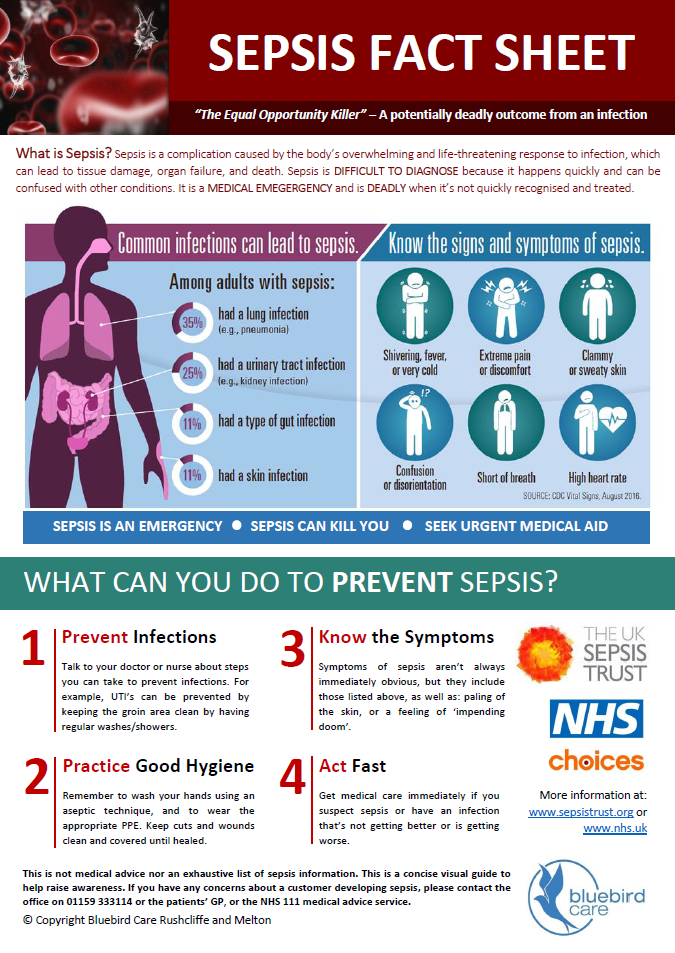Sepsis prevention
Sepsis is a potentially life-threatening condition caused by the body’s response to an infection.
Sepsis is a potentially life-threatening condition caused by the body’s response to a serious infection. It can lead to tissue damage, organ failure, and death if not promptly treated. Older adults are particularly vulnerable to sepsis due to weaker immune systems and the presence of chronic health conditions. Bluebird Care Rushcliffe & Melton is keen to share some tips to help you understand, prevent, and recognise sepsis.
1. Understand Sepsis
- What is Sepsis? Sepsis occurs when an infection triggers a severe response from the body’s immune system, causing widespread inflammation.
- Common Sources: Infections that can lead to sepsis include pneumonia, urinary tract infections (UTIs), skin infections, and gastrointestinal infections.
2. Prevent Infections
- Vaccinations: Stay up to date with vaccinations, including flu, pneumonia, and shingles vaccines.
- Good Hygiene: Practice good hygiene by washing your hands frequently with soap and water, especially before eating, after using the toilet, and after being in public places.
- Wound Care: Keep wounds clean and covered until they heal. Seek medical attention for deep cuts, burns, or wounds that show signs of infection.
3. Manage Chronic Conditions
- Regular Check-ups: Have regular medical check-ups to manage chronic conditions such as diabetes, heart disease, and respiratory conditions.
- Medication Adherence: Take prescribed medications as directed by your GP to keep chronic conditions under control.
4. Know the Symptoms of Sepsis
- Early Signs: Common early signs of sepsis include fever, chills, rapid breathing, rapid heart rate, and confusion or disorientation.
- Severe Symptoms: Severe symptoms can include extreme pain or discomfort, clammy or sweaty skin, shortness of breath, and decreased urine output.
5. Seek Prompt Medical Attention
- Act Quickly: If you or a loved one exhibit signs of sepsis, seek medical attention immediately. Early treatment is crucial.
- Emergency Services: Don’t hesitate to call emergency services or go to the emergency room if symptoms worsen or if you suspect sepsis.
6. Boost Your Immune System
- Healthy Diet: Eat a balanced diet rich in fruits, vegetables, lean proteins, and whole grains to support your immune system.
- Regular Exercise: Engage in regular physical activity, as it can strengthen your immune system and overall health.
- Adequate Sleep: Ensure you get enough sleep each night to allow your body to recover and fight off infections.
7. Stay Informed
- Educate Yourself: Learn about the risks, symptoms, and prevention strategies for sepsis. Knowledge is your best defense.
- Communicate with Healthcare Providers: Discuss your risk of sepsis with your GP, especially if you have chronic conditions or a history of infections.
8. Maintain a Clean Environment
- Sanitise Surfaces: Regularly clean and disinfect frequently touched surfaces in your home, such as doorknobs, light switches, and remote controls.
- Safe Food Handling: Practice safe food handling by thoroughly cooking meat, washing fruits and vegetables, and avoiding cross-contamination in the kitchen.
9. Recognise High-Risk Situations
- Hospital Stays: Be vigilant about signs of infection if you have recently been hospitalised or undergone surgery.
- Catheters and IVs: Ensure proper care and hygiene if you use catheters or have intravenous (IV) lines.
10. Support System
- Family and Friends: Make sure your family and friends are aware of the signs of sepsis and the importance of seeking prompt medical attention.
- Care Experts: Bluebird Care Rushcliffe & Melton's highly trained team of Care Assistants will monitor your wellbeing and look out for signs and symptoms of infection.
With Bluebird Care Rushcliffe & Melton's support, by understanding sepsis and taking preventive measures you can significantly reduce your risk and ensure timely treatment if necessary. Our team of Care Experts advise you to stay informed, stay healthy, and seek medical help promptly if you suspect sepsis.

How to find the right care for you or your relative
1. Find your local office
Bluebird Care delivers care from locally based offices, find yours to start your care journey today.
2. Get in touch with us
Fill in our call back form or give us a call to find out how we can help you.
3. Assessment
We’ll come out to you to find out what you or your loved one needs to help stay independent at home.
4. Care team chosen & care starts
You'll be cared for by our specially trained team to support you to remain at home for as long as possible.

